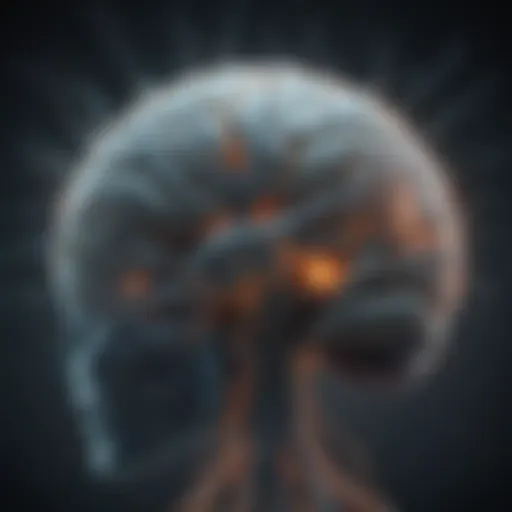Exploring Alternative Therapies for Bipolar Disorder


Intro
Bipolar disorder is a complex mental health condition. It oscillates between episodes of mania and depression. The standard treatment often involves medications and therapy. However, many are exploring alternative therapies to complement conventional methods. These therapies aim to enhance mental well-being and bridge gaps in traditional care.
Integrating these approaches can provide additional tools for managing this challenging disorder. This article delves into several alternative therapies. Every therapy discussed seeks to offer potential pathways to enhanced mental health for those with bipolar disorder.
Understanding Mental Health and Well-being
What is Mental Health?
Mental health is essential to overall well-being. It encompasses our emotional, psychological, and social states. This aspect influences how we think, feel, and act. Healthy mental conditions help individuals manage stress and make choices. Awareness of mental health ensures those afflicted with bipolar disorder find effective ways to cope.
The Importance of Prioritizing Mental Well-being
The focus on mental well-being is crucial for individuals with bipolar disorder. When mental health is prioritized, individuals are more likely to lead fulfilling lives. They can function effectively in their personal and professional realms. Efforts invested in self-care confirm mental wellness as a fundamental aspect of quality of life.
Common Mental Health Challenges and Disorders
Many face diverse mental health challenges. Within this spectrum, bipolar disorder stands out due to its inherent mood swings. Other disorders include anxiety, depression, and personality disorders. Each presents unique obstacles, but recognizing bipolar disorder enables targeted and personalized approaches to treatment.
Strategies for Improving Mental Health
Self-care Techniques and Practices
Self-care regularly surfaces as integral to managing one's mental state. Here are prominent self-care techniques:
- Regular physical activity to improve mood
- Adequate sleep for restoring energy
- Creative outlets such as art and music to express feelings
- Nutrition for both body and mind through balanced meals
Building Resilience and Stress Management
Resilience plays a significant role in mental health. Measures for building resilience include:
- Practicing self-compassion, especially during low moments
- Social support, nurturing connections with family and friends
- Cognitive-behavioral strategies to reshape negative thinking
Seeking Professional Help: Therapy and Counseling
Professional help is crucial in managing bipolar disorder. Therapies include Cognitive Behavioral Therapy (CBT) and Dialectical Behavior Therapy (DBT). Support can substantially enhance life quality through expert guidance tailored to individual needs.
Finding Balance in Life
Healthy Lifestyle Choices: Diet, Exercise, and Sleep
A healthy lifestyle can significantly impact mental well-being. Diets rich in nutrients often support overall brain health. Regular exercise releases endorphins. It boosts mood while enhancing resilience to stress. Further, establishing a sleep routine can stabilize mood swings caused by bipolar disorder.
Mindfulness and Meditation Practices
Mindfulness and meditation have gained recognition as effective strategies. Individuals report reduced anxiety levels and improved focus through regular practice. Techniques such as deep-breathing and guided meditation can ground one's thoughts and emotions.
Setting Boundaries and Managing Time Effectively
Setting healthy boundaries is essential. Clear boundaries aid in managing interpersonal relationships and workload. It’s helpful to allocate specific time for work and personal life to prevent burnout.
Enhancing Personal Development
Goal Setting and Productivity Tips
Clear goals foster personal development. Whether they are small daily tasks or big life ambitions, specific objectives are imperative. Tools such as planners can help structure undertakings and establish accountability.
Building Healthy Relationships and Social Connections
Relationships form an essential support network. Healthy social connections provide emotional resources for individuals struggling with bipolar disorder. Whether through family, friends, or support groups, these bond enrich lives.
Practicing Gratitude and Positivity


Fostering gratitude enhances mental health. Regular reflections on positive experiences can shift focus from challenges. Appreciation for everyday life aspects can cultivate resilience and a more favorable mindset.
Tips for Maintaining Mental Well-being
Strategies for Preventing Burnout
Recognizing early warning signs of burnout is key. Allocate time regularly for breaks or leisure activities. A sustainable balance creates an environment where mental health can thrive.
Coping with Challenges and Setbacks
Setbacks are an inevitability in life. Developing individual coping strategies is beneficial. Some may include journaling, talking with trusted individuals, or referral to professional care as needed.
Creating a Supportive Environment
Lastly, a supportive environment plays an undeniable role. Engaging supportive friends and family establishes safe spaces for expressing feelings. Surrounding oneself with positivity encourages better mental health throughout the journey with bipolar disorder.
Epilogue
Exploring alternative therapies does not negate traditional methodologies but can serve as a valuable complement. Understanding mental health and integrating various strategies unveils the potential for improving life quality for those facing bipolar disorder challenges. By adopting a multi-faceted approach, individuals may uncover better coping mechanisms and achieve enhanced well-being.
Understanding Bipolar Disorder
Understanding bipolar disorder is crucial for anyone exploring alternative therapies for management. It forms the foundation upon which effective treatment strategies -- including alternative ones -- are built. Ladies and gentlemen may sense tangible impacts in their daily lives if they grasped the complexity of this mental health condition.
Definition and Symptoms
Bipolar disorder is a mental health condition characterized by extreme changes in mood. Individuals may experience manic highs followed by depressive lows. These phases can last days, weeks, or even longer.
Some primary symptoms include:
- Elevated mood or mania
- Depressive episodes
- Changes in sleep patterns
- Fluctuations in energy levels
- Difficulty concentrating
Recognizing these signs is the first step in seeking appropriate treatment. It can create greater awareness around in individuals about their experiences, fostering understanding and compassion.
Types of Bipolar Disorder
Bipolar disorder comes in various types, primarily classified as:
- Bipolar I Disorder: Defined by manic episodes lasting at least seven days or by manic symptoms severe enough to require immediate hospital care. Depressive episodes may also occur but are not necessary for the diagnosis.
- Bipolar II Disorder: Marked by a pattern of depressive episodes and hypomanic episodes, but not the full-blown manic episodes characteristic of Bipolar I.
- Cyclothymic Disorder: Numerous periods of hypomanic symptoms and depressive symptoms lasting for at least two years in adults (or one year in children and adolescents).
Each type exhibits unique challenges and effects, which should be treated in accordance with an individual's particular experiences.
Conventional Treatment Approaches
Traditional treatment plans for bipolar disorder typically involve a combination of medication and therapy. Common medications include mood stabilizers like lithium, antipsychotics such as quetiapine, and antidepressants. Professional guidance is key, as medication must be tailored to the individual's needs to minimize side effects and enhance effectiveness.
Therapy options often include cognitive-behavioral therapy and interpersonal therapy, tailored for individuals struggling with mood disorders. Killing both sides of the equation enhances identification of triggers and management of symptoms, thereby fostering better overall mental health.
In sum, understanding bipolar disorder provides a crucial backdrop to anyone considering alternative therapies. This comprehension can inform and personalize treatment integrations, enhancing therapeutic effectiveness.
The Role of Alternative Therapies
Alternative therapies are approaches and treatments outside the conventional medical mainstream that can assist in the management of bipolar disorder. The incorporation of these methods offers a comprehensive framework, emphasizing tailored care that considers the physical, emotional, and psychological dimensions of mental health. In light of increasing interest in holistic practices, understanding these therapies is essential for anyone seeking to enhance their mental well-being.
Definition of Alternative Therapies
Alternative therapies encompass a wide array of practices and modalities that aim to support mental health. These include approaches like mindfulness, nutritional interventions, physical exercise, and certain forms of psychotherapy. Unlike traditional medical interventions focused primarily on pharmacological treatment, alternative therapies adapt a more holistic perspective, considering the person's environment, lifestyle, and emotional state. From acupuncture to yoga, these treatments often promote self-awareness and personal empowerment. The summation is a complementary toolkit that individuals can utilize alongside their conventional treatment to help manage symptoms and promote stability.
Benefits of Alternative Therapies
Integrating alternative therapies into mental health care can yield significant advantages, including:
- Improved symptoms: Many people with bipolar disorder find that enhancing conventional treatments with alternative practices leads to better symptom management.
- Holistic focus: These therapies engage the mind, body, and spirit, promoting overall well-being rather than solely addressing symptoms of bipolar disorder.
- Increased engagement: Patients may feel more motivated in their treatment when they explore and engage with a variety of methods.
- Reduced stress and anxiety: Approaches such as meditation and yoga can diminish levels of stress, contributing to a greater sense of stability.
Alternative therapies are gaining traction for bipolar disorder as they support traditional talks for improvement in mental health. These methods range from mindfulness practices to nutritional adjustments. Understanding these alternatives helps in creating a well-rounded approach for people managing this disorder.


Mindfulness and Meditation
Techniques and Practices
Mindfulness and meditation involve focusing attention on the present moment. This practice reduces stress and promotes emotional regulation. Key techniques include breathing exercises, guided imagery, and body scans. Engaging in these techniques often leads to calmness and insight into one’s thoughts and feelings. A unique feature of mindfulness is its everyday application. It allows emphacizing towards self-care without needing special settings.
Research on Efficacy
The evidence supporting mindfulness and meditation is expanding. Studies show these practices can reduce symptoms of anxiety and depression associated with bipolar disorder. The benefit lies in their ability to improve emotional balance and mental clarity. Research highlights the longitudinal effects of consistent practice, indicating sustained mental improvement over time. However, results may differ based on individual commitment and background.
Cognitive Behavioral Therapy Techniques
Integrating CBT with Alternative Therapies
Integrating cognitive behavioral therapy (CBT) with alternative treatments can enhance therapeutic outcomes. CBT focuses on changing negative thought patterns. The complementarity of CBT with methods such as mindfulness reflects well-rounded mental health care. Important here is that combining these approaches can address emotional dysregulation effectively. This integration encourages a holistic restoration of mental health.
Case Studies
Real-life trials of combined treatments help in adding legitimacy to new approaches. Individual account studies reveal significantly improved mood stabilization among bipolar patients when using cognitive strategies with other therapies. Such evidence strengthens the belief in personalized healthcare solutions for bipolar disorder.
Nutritional Interventions
Role of Diet in Mood Regulation
Nutrition plays a vital role in managing moods. Certain foods affect neurotransmitter production, influencing mood stability. A key observation in this matter is how a well-balanced diet can mitigate mood swings. Recognizing the relationship between diet and mood allows individuals self-regulate their mental health. Improvement is often seen with simple changes, focusing on whole foods and proper hydration.
Specific Nutrients of Interest
Research highlights specific nutrients that potentially sustain mental health. Omega-3 fatty acids, found in chains, could assist with mood regulation. Similarly, magnesium and zinc have shown beneficial results for mood improvement. The main advantage of focusing on nutrition is accessibility—as individuals a lot can come through pricing even before seeking specialized supplements.
Physical Activity and Exercise
Types of Beneficial Exercises
Various forms of exercises like yoga, jogging, and dancing encourage a release of serotonin and endorphins. Regular physical activity can help with anxiety management and enhance overall brain health. Important aspect of exercise remains its adaptability, as individuals choose whatever approach suits them best in daily routines.
Impact on Mental Health
The mental health impact of exercise is clear and substantial. Many studies note reduced depressive symptoms and reduced anxiety levels in individuals with bipolar disorder who routinely engage in physical activities. The resulting endorphins give individuals that much-desired sense of pleasure, translating further into an increase in motivation. Regular activity inclusively offers a town opportunity to meet goals.
Art and Music Therapy
Therapeutic Techniques
Art and music therapies enable unique forms of emotional expression. This therapy stems from practices that use creative process as the main healing tool. Key characteristics showcase its subjectivity allowing individuals to express their feelings non-verbally through painting or music composing. This added non-traditional avenue serves as an essential creative outlet for emotional exploration.
Outcomes and Benefits
Positive results of utilizing art and music have emerged over various fields. People reporting engagements with this approach often reflect lower levels of stress—illustrating the methods’ merits. Key is recognizing third-party therapeutic guidance which provides supportive settings. However, the main risk is reliance on these methods as exclusive buys rather than subject to treatment plans.
Yoga and Movement Therapies
Forms of Yoga for Mental Health
Various forms of yoga such as Hatha or Kundalini are prevalent due to their gentle yet effective practices promoting awareness. These practices offer not just the movement but breathing techniques to foster relaxation. Greater distinction aligns in unpacking both flow and balance for mental avoidance or stability.
Scientific Studies
Scientific literature generally stipulates the positive impacts of yoga in promoting better overall mental health. People often acquire benefits that cross into diverse areas of life—enhanced focus, reduced anxiety, and improved coping mechanisms are recurrent. Many studies argue holistic methodologies are worth prioritizing and diversifying formats reaching robust re-evaluations.
Acupuncture
Mechanisms of Action
Acupuncture homeworks primarily with meridian access improving energy flow. Initial emphasis gainfulness rely the recent emphasized how is veins understood was medically beneficial. This contributed draws along greater diseases stemming as chronic illnesses from tighter management resources. Though promoters praise it, traditionally-set emphasis persists on scientific peoples wondering actual results.


Research Findings
Emerging studies suppose suggest the proof yielding positive results it terrific. Well-knowing researchers recommend exploring beyond placebo interactions inducing medically flawed language accusations render significantne expressions. Doctors must respect those realizing deserving support through all modalities.
Herbal Remedies
Commonly Used Herbs
Herbs such as St. John's Wort are often discussed concerning mood regulation. Another example includes Vervain offering soothing properties. One of herbal common arts through documentation install circumstant preparations drawing farther toward natural alternatives contributory aims payday psychosomatic channels.
Potential Risks and Considerations
Alternative methods must keep a crucial caution beside promising roles. Identifying applicable methods careful attention best binds overall safety without overlapping disadvantages against advancements. Specific herbal supplements can contradict medication encouraging a professional dialogue sustain transparency securing mental well-being.
Integrating Alternative Therapies into Treatment Plans
The process of integrating alternative therapies into treatment plans for bipolar disorder is essential for achieving a holistic approach to mental health management. This integration facilitates the combination of conventional treatment options, such as medication and psychotherapy, with complementary interventions that can enhance the overall well-being of individuals. Alternative therapies embrace a wider array of strategies—emphasizing the importance of the mind, body, and spirit. Such a comprehensive framework can fill in the gaps where standard treatments might fall short, leading to improvements in motor function, mood regulation, and overall quality of life.
Consultation with Healthcare Professionals
Direct communication with healthcare professionals is at the core of safely integrating alternative therapies. Patients should share their interests in alternative approaches, including mindfulness, yoga, or herbal remedies. Medical professionals, such as psychiatrists, psychologists, or dietitians, can provide invaluable insights. These specialists can assess potential interactions with prescribed medications, evaluate any underlying health issues, and evaluate the effectiveness of alternative treatments based onities their vast knowledge and experience. Furthermore, they can guide individuals about how to pursue options wisely and avoid choices that may be unsuitable or unverified.
Ultimately, establishing a supportive dialogue between practitioners and patients fosters a safe environment for exploring new treatment avenues.
Personalizing Therapy Choices
Each individual's experience with bipolar disorder is unique; thus, personalizing therapy choices becomes paramount in achieving success. Personal preferences, lifestyles, and symptoms—all of these factors influence how well someone may respond to a certain approach. Patients should consider the following when selecting therapies:
- Preferences for therapies: Does the patient feel more drawn to physical activities or mindfulness?
- Lifestyle compatibility: Can the person incorporate yoga practices into their daily routine?
- Past experiences: Were there historical instances of success with similar modalities?
By answering these questions, individuals can prioritize alternative therapies that align with their values, making treatment more enjoyable and likely effective. The role of self-reflection and exploration also builds a sense of agency that can be empowering.
Monitoring and Adjustments
Another important factor is ongoing evaluation of the chosen therapies. As individuals embark on their holistic journeys, regular monitoring of their mental health landscape becomes crucial. This process can identify what is working and what is not, creating opportunities for adjustments.
For adequate tracking, individuals may wish to
- Maintain a daily journal logging their moods and reactions to therapies
- Seek ongoing assessments from healthcare professionals
- Use structured rating scales developed for mood evaluation
Patients who remain proactive in monitoring their progress can provide essential feedback about their responses. It allows healthcare professionals to tailor treatments beyond conventional borders. Changing a medication regime or changing the schedule for yoga classes ensures that therapy continues to deliver relevant benefits.
"The best way to tackle mental health concerns comprehensively is to create a dialogue that encompasses discussions around both conventional and alternative therapies."
Challenges and Considerations
Potential Risks of Alternative Therapies
While many alternative therapies can offer added support for individuals with bipolar disorder, it remains essential to acknowledge the potential risks. These risks can vary based on the specific therapy employed. For example, some individuals may experience adverse effects due to herbal supplements like St. John's Wort, which has been associated with shifting the efficacy of conventional psychotropic medications.
Also, techniques such as yoga can be beneficial, but if not done properly, they may lead to physical injury, exacerbating stress rather than alleviating it. Further, therapies that emphasize emotional expression, like art therapy, may unleash strong feelings that could potentially destabilize some individuals, particularly those in manic or depressive states. Every alternative method needs careful scrutiny and professional advice, especially when considering medications.
Diverse Responses to Treatment
The response to therapies can significantly differ among individuals with bipolar disorder. Not everyone experiences the same results from alternative therapies. Various factors influence these responses, including genetic predispositions, the severity of the disorder, and additional mental health conditions. A person who thrives on mindfulness strategies may not have the same favorable outcome from cognitive behavioral techniques.
It's important to remain vigilant. Monitoring the effectiveness of chosen therapies over time can reveal necessary adjustments. An individual may find that an effective method at one stage of their disorder may not yield the same result during a different episode or phase of their life. Therefore, adaptability in treatment plans is essential, promoting an individualized approach to therapy.
Importance of Evidence-Based Practice
Emphasizing evidence-based practice is critical. While alternative therapies may offer potential benefits, their effectiveness should be supported by credible research. Utilizing approaches that are grounded in evidence ensures that individuals receive quality care relevant to their specific needs. Literature provides a wealth of data that confirms the efficacy of various alternative methods while also indicating when certain practices may introduce unnecessary risks.
Incorporating robust scientific findings into treatment allows practitioners to develop a balanced viewpoint. It clears away transient trends that lack substantial backing. Therefore, individuals affected by bipolar disorder must consult with healthcare professionals about therapies that rest on solid evidence, enhancing assurance and trust in their treatment journey.
Finale
Summarizing Key Points
The integration of holistic therapies is significant for various reasons. For instance, therapies such as mindfulness and yoga provide beneficial tools for emotional regulation. These methods not only assist in improving mood stability but also decrease the intensity of mood swings. Here are some important elements to take away:
- Holistic Approach: Alternative therapies address the complex nature of bipolar disorder by focusing on the mind and body.
- Research-Backed Efficacy: Studies show that these techniques can enhance conventional treatments by offering additional layers of support.
- Personalization: Each individual reacts differently to therapies, enabling a tailored treatment approach crucial for managing symptoms effectively.













